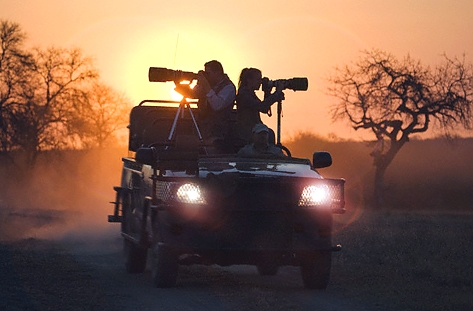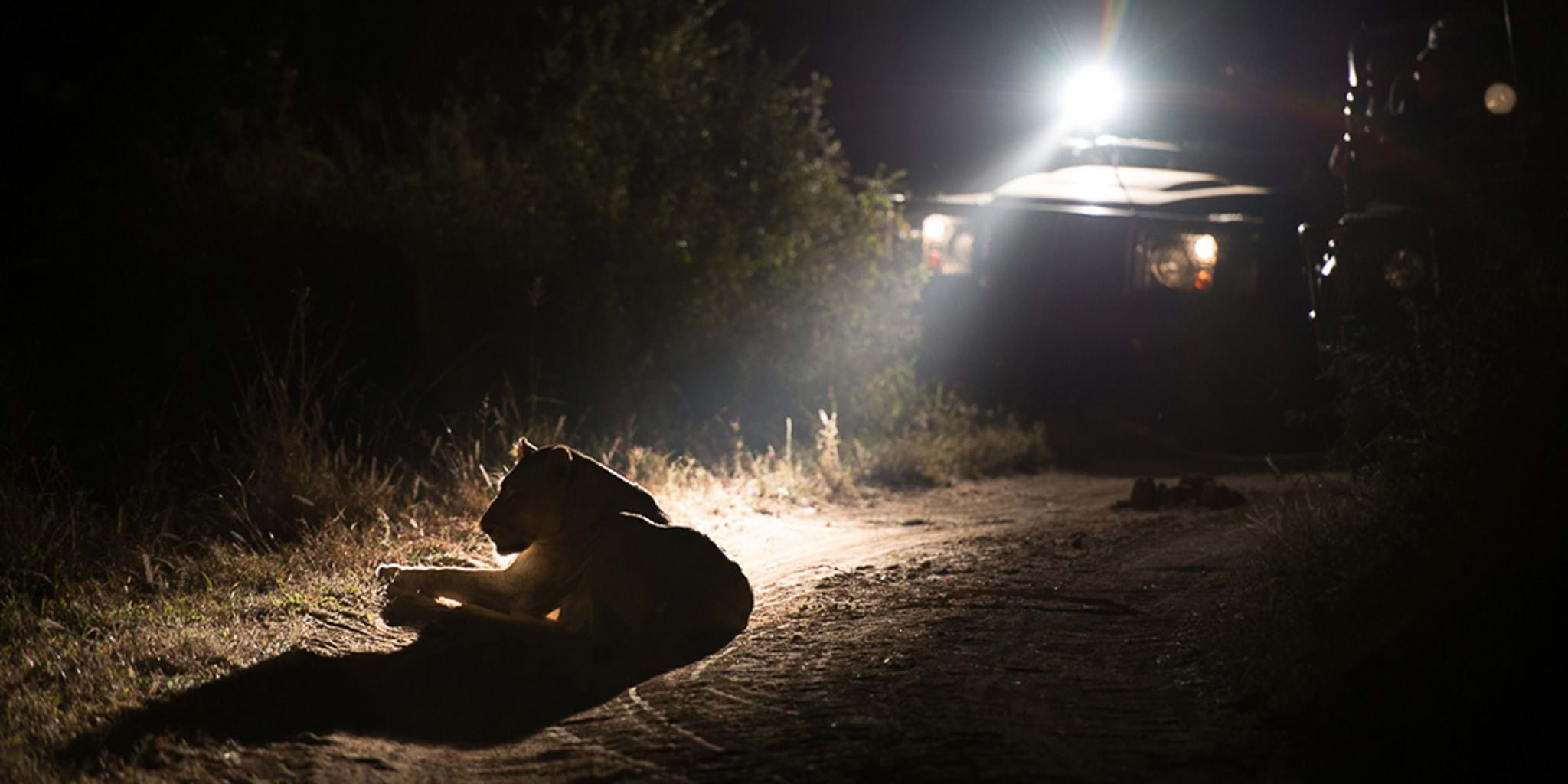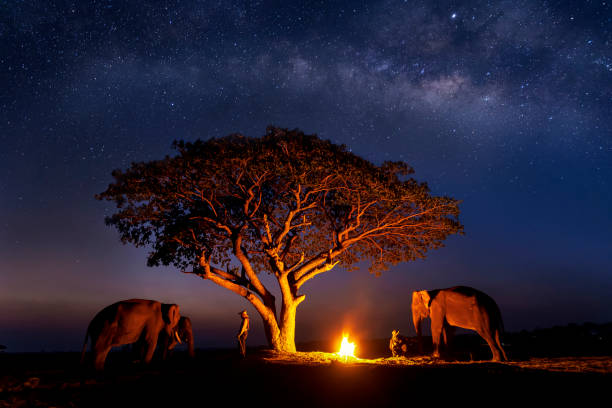For quite a number of people, the allure of an African safari vacation is undeniable. The continent’s vast landscapes, from golden savannahs to dense jungles, are home to some of the world’s most iconic wildlife. Yet, while daytime safaris offer breathtaking encounters with Africa’s majestic creatures, it’s the promise of nighttime adventures that often piques the curiosity of the most ardent wildlife enthusiasts.
Night game drives plunge you into a world where the rules of the wilderness shift, and nocturnal animals rule the roost. But with this unique experience o f night game drives comes an inevitable question: How safe are these nocturnal excursions?
In this article, we have a look into the safety aspects of night game drives. We point out the risks and rewards of night game drives. We also offer insights that will in ensuring that your moonlit adventure remains both thrilling and secure.
As an adventure activity, and just like any adventure into the wild, there are inherent risks that come with night game drives. Here’s a deeper dive into those risks and how they can be mitigated:

Safaris by Night in Africa
A night game drive is one of the most exhilarating activities one can undertake during an African safari vacation. Unlike the typical daytime safari excursions, a night game drive offers you a chance to witness the African wilderness under the cloak of darkness, revealing a side of the bush that few bold and adventurous get to see.
Potential Risks of Night Safaris and How to Stay Safe
Unpredictability of Wild Animals
Animals can be more unpredictable at night, especially nocturnal predators like leopards and hyenas. Some animals may feel threatened by the presence of safari vehicles during their prime hunting or foraging time.
How do you stay safe from unpredictable animals at night? Here is the thing; Only seasoned safari guides with specific training in nocturnal wildlife behavior and navigation should conduct night safaris. They understand animal behavior patterns and know how to safely navigate the landscape in low light.
Reduced Visibility at Night
The limited light can make it more challenging for both guides and tourists to see and respond to potential threats. Unexpected obstacles or terrains might be harder to navigate.
To make sure that the challenge of limited visibility does not pose any dangers during night game drives, there is limited use of spotlights. However, instead of continuous lighting, using spotlights intermittently and judiciously ensures animals are not unduly disturbed. Some tours also use red filters on their lights, which are less disturbing to animals.
Bright lights can disturb or temporarily blind animals, making them more stressed or aggressive.
Possible Disorientation at Night
In the vast expanses of African parks and reserves, it’s easier to get disoriented in the dark, potentially leading to longer times spent in the park or even getting lost.
To ensure that tourists do not get lost in the wilderness at night, there are strict protocols in place. As a general rule, these protocols must be followed in all places that offer night game drives. Such protocols include, but are not limited to; maintaining a safe distance from animals, staying within designated areas, and ensuring tourists remain seated and quiet during the drive.
Night drives should have a specified start and end time to ensure that they don’t go on for too long, reducing the risk of fatigue or disorientation.
Temperature Drops in the evenings
Evenings and nighttime in many African regions can see a significant drop in temperature, which could lead to cold-related risks if unprepared. Stay Prepared:
Tourists should be advised to dress in layers to handle the nighttime drop in temperature. Bringing along essentials like water, snacks, and a first aid kit can also be helpful.
Other human Factors:
The excitement or fear can cause tourists to act unpredictably or not follow guidelines, leading to potential mishaps. That calls for educating all tourists taking part on night game drives. Before embarking on the night safari, tourists should be thoroughly briefed about the do’s and don’ts. This includes information about not using flash photography, keeping silent, and avoiding sudden movements.
Equipment Checks:
Ensure the safari vehicle is in good working order, with all lights functioning correctly. Having a backup vehicle or communication method can be crucial if there are any issues.
Night Game Drive on an African Safari – A glimpse and overview

Creating The Atmosphere for Night time safaris:
As the sun sets and darkness blankets the savannah, the landscape undergoes a transformation. The temperature drops, and a symphony of night sounds — from the distant roar of lions to the chirping of nocturnal insects — fills the air. The atmosphere is one of mystery, heightened senses, and anticipation.
Night time Animals on safari:
Many African animals are crepuscular (active during dawn and dusk) or nocturnal (active at night). A night game drive offers the unique opportunity to spot these elusive creatures. Guests might catch a glimpse of leopards on the hunt, lions feasting on a fresh kill, or the reflective eyes of a bushbaby peering from the trees. Hyenas, porcupines, genets, and owls are among the other species that come alive after dark.
Night Game Drive Equipment:
Specialized vehicles are used for night drives, typically equipped with a powerful spotlight that the guide uses to scan the surroundings. The light often catches the reflective eyes of animals, making them easier to spot in the darkness.
Night Game drive Guidance:
Night game drives are led by experienced guides who are trained to navigate the African bush during nighttime and have a keen understanding of animal behavior. Their expertise ensures not only that guests have the best chances of spotting wildlife but also that the drive is conducted in an ethical manner, without disturbing the natural behavior of the animals.
Safety & Etiquette during Night Game Drives: Safety is paramount. Guests are usually briefed before the drive about the dos and don’ts. This includes staying quiet, keeping limbs within the vehicle at all times, and not using flash photography, as it can disturb and potentially blind the animals.

Where in Africa can you enjoy Night Game Drives?
Not all national parks or reserves in Africa permit night game drives, as some areas are strictly regulated to protect wildlife from excessive human interference. However, many private game reserves and conservancies offer this unique experience as part of their safari package.
Here’s a list of some of the top places where you can embark on a night game drive:
South Africa:
Kruger National Park: Some of the private lodges in the Greater Kruger area offer night drives.
Sabi Sand Game Reserve: Adjacent to Kruger, this private reserve is famous for its leopard sightings during night drives.
Phinda Private Game Reserve: In KwaZulu-Natal, this reserve offers a variety of safari experiences including night drives.
Botswana:
Moremi Game Reserve: Located in the Okavango Delta, it’s one of the few places in Botswana that allows night game drives.
Linyanti Wildlife Reserve: This private reserve offers night drives as part of its safari experience.
Zambia:
South Luangwa National Park: Renowned for walking safaris, South Luangwa also offers exceptional night drives, with opportunities to see leopards.
Lower Zambezi National Park: Another destination for nocturnal wildlife experiences in Zambia.
Kenya:
Laikipia Plateau: Many of the private conservancies in this region offer night drives.
Mara Naboisho Conservancy: Adjacent to the Masai Mara National Reserve, Naboisho allows night game drives, unlike the main reserve.
Tanzania:
Lake Manyara National Park: Offers special night game drives with a chance to spot nocturnal creatures.
Tarangire National Park: Some lodges and camps offer night drives in their private concessions adjacent to the park.
Namibia:
Etosha National Park: Some of the private concessions around the park offer night drives.
NamibRand Nature Reserve: This reserve offers night game drives focusing on both wildlife and stargazing.
Zimbabwe:
Malilangwe Wildlife Reserve: Home to Singita Pamushana Lodge, this reserve offers a variety of safari experiences including night drives.
Key Take Aways
In conclusion, while night safaris offer an unparalleled opportunity to witness the mystique of the African wilderness after dark, it’s essential to approach them with respect and caution. By understanding the risks and employing sound mitigation strategies, tourists can enjoy a thrilling yet safe nocturnal adventure.
It’s essential to note that the availability of night drives can be subject to change based on park regulations and conservation considerations. Furthermore, while some public national parks may not allow night drives, adjacent private reserves or conservancies often do. Always check with your tour operator or lodge to ensure that night drives are offered during your stay.

